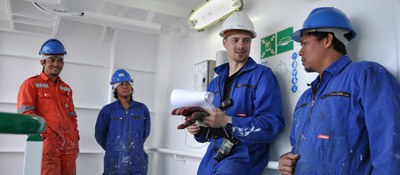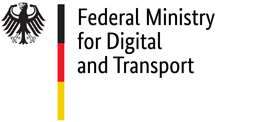Abteilung ISM / ILO - Bereich Seearbeitsrecht
Brandstwiete 1
20457 Hamburg
Fax: +49 40 361 37-204
Mail: ISM-MLC@bg-verkehr.de

Tilo Berger
Phone: +49 40 36137-213
Mail: ism-mlc@bg-verkehr.de

Sven Reese
Phone: +49 40 36137-313
Mail: ism-mlc@bg-verkehr.de

Kathrin Saß
Phone: +49 40 36137-260
Mail: ism-mlc@bg-verkehr.de

Florian Reise
Phone: +49 40 36137-214
Mail: ism-mlc@bg-verkehr.de
Maritime labour law
Maritime Labour Convention (MLC) improves working and living conditions for seafarers
The Maritime Labour Convention (MLC) of the International Labour Organization (ILO) is known to many experts as the "fourth pillar" of the international maritime regulatory regime. For good reason, as the convention sets out mandatory minimum standards for decent working and living conditions for more than 1.2 million seafarers all over the world. Compliance with these regulations is controlled by means of periodical inspections by flag states and port states.
The convention has globally entered into force on 20 August 2013. Germany has ratified the MLC on 16 August 2013.
Follow the link for the complete text of the MLC.
What has changed in German shipping?
The international Maritime Labour Convention (MLC) had considerable implications for shipping under the German flag:
- Prior to employment on board each seafarer must receive from the shipowner/employer an employment agreement in writing, containing prescribed particulars.
- Private seafarer recruitment and placement agencies must be approved and closely supervised by a competent authority.
- Continued payment of wages in case of illness is increased by another 10 weeks on top of the statutory 6 weeks.
- Seafarers are entitled to lodge complaints regarding working and living conditions on board also directly with the flag state.
- Compliance with the requirements is verified by regular inspections.
- Ships engaged on international voyages must have two new documents: the maritime labour certificate and the declaration of maritime labour compliance.
- Ships can be detained due to serious deficiencies in the working and living conditions on board.

Maritime labour act creates binding standards
The "Seearbeitsgesetz" (maritime labour act, preliminary English version) is the core of the implementation of the Maritime Labour Convention of the International Labour Organization (ILO) in German law. The Maritime Labour Convention creates worldwide binding minimum standards for working and living conditions of seafarers on board of ships. It applies to about 1,2 million seafarers on board of about 65.000 ships.
Basically, the maritime labour act applies to each person who is employed or engaged on board of a ship under German flag. The procedure for the determination of medical fitness, apprenticeship on board and medical equipment have been placed on a uniform legal basis which corresponds with practical experience. The objectives of the Maritime Labour Convention concerning recruitment and placement, inspections on board and the social security of seafarers have been newly defined.
The former seamans act, adopted in 1957, has been replaced. The contents, especially the entitlement to leave, the right of termination and repatriation will have been modernized in the maritime labour act. The existing system of flag state and port state control has been extended to the inspection of seafarers' working and living conditions. Introducing minimum standards in both labour and social law, the maritime labour act contributes to a fair competition in global sea trade.








